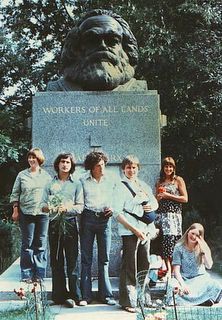Karl Marx is the greatest

Karl Marx is the greatest philosopher, according to a poll conducted by the BBC. Some 34,000 listeners cast votes after hearing advocates for the various candidates, with Marx pulling in almost 28% of votes, more than twice as many as runner-up David Hume. Rounding out the top ten were Ludwig Wittgenstein, Friedrich Nietzsche, Plato, Immanuel Kant, St. Thomas Aquinas, Socrates, Aristotle, and Karl Popper. The result is bound to confirm the belief of right-wingers that the BBC and its listeners are a bunch of unreconstructed Bolsheviks, just as Tommy Douglas's victory in the Greatest Canadian contest confirmed their worst suspicions about the CBC and its listeners.
Although trying to judge who is the single "greatest" person in any field of endeavour (even hockey) is a mug's game, certainly Marx and Hume rank high on my list of great intellectuals. Many would say that Hume was a philosopher's philosopher, in a way that Marx wasn't--and Marx no doubt would have agreed. As he famously wrote: "Philosophers have only interpreted the world, in various ways; the point, however, is to change it." Marx is often viewed primarily as an economist and political activist, though he is at the same time very much a social and political philosopher. Karl Popper, who decried what he saw as the totalitarian implications of the thought of Plato and Marx, nevertheless recognized the contribution Marx made to social science through emphasizing the importance of economic and technological factors in history. The prominent economic historian Robert Heilbroner (1919-2005), who was both sympathetic to and critical of Marx, wrote that Marx's model of the capitalist economy "displayed extraordinary predictive capacity" and that, despite its limitations, Marx's analysis "remains the gravest, most penetrating examination the capitalist system has ever undergone." (Surely there is something to be said for an economist who, in discussing the distinction between productive and unproductive labour, speaks of Milton producing Paradise Lost "as a silkworm produces silk, by expressing his nature through his activity.") As for Marx's general theory of historical development, which asserts that economic structures survive or fall as they promote or hinder the development of society's productive powers, this was corroborated (i.e., lent support) by the collapse of the Soviet Union, was it not?
If I remember correctly, Karl Marx and David Hume have at least one academic distinction in common: they were both turned down when they applied for teaching positions at the University of Edinburgh.




<< Home